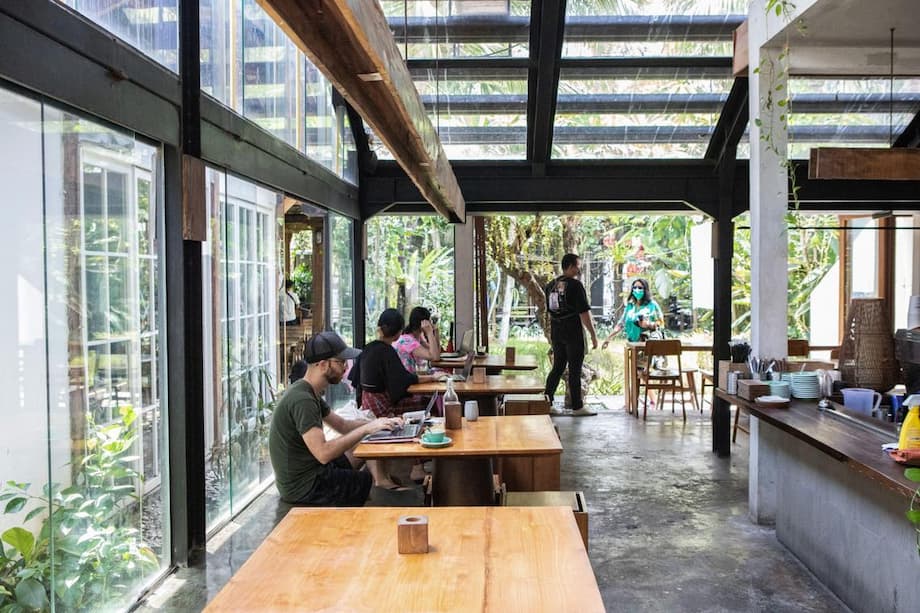Indonesia’s Cafés Fall Silent: The Royalty Crackdown That Changed the Soundtrack of Daily Life
In recent months, the familiar hum of Indonesian pop and rock music has faded from cafés and restaurants across the country. Where once the air was filled with the latest hits and local indie anthems, now only the hiss of espresso machines and the clink of cups remain. This sudden silence is not a matter of taste or trend, but the result of a sweeping crackdown on unpaid music royalties—a move that has left business owners anxious, musicians divided, and the public confused about what music can be played, and at what cost.
- Indonesia’s Cafés Fall Silent: The Royalty Crackdown That Changed the Soundtrack of Daily Life
- What Triggered the Crackdown? The Mie Gacoan Case and Its Ripple Effect
- Understanding Indonesia’s Music Royalty System
- Musicians Divided: Who Should Get Paid, and How?
- Legal Confusion and the Impact on Public Life
- Transparency, Technology, and the Path Forward
- Culture in Crisis: The Broader Impact on Indonesian Society
- Government Response and the Search for Solutions
- In Summary
What Triggered the Crackdown? The Mie Gacoan Case and Its Ripple Effect
The catalyst for this nationwide shift was a high-profile dispute involving Mie Gacoan, a popular noodle restaurant chain. In August 2024, the Bali franchise was reported for failing to pay music royalties since 2022. After months of warnings and failed mediation attempts by the Indonesian Music License Center (SELMI), the case escalated to police involvement. The franchise eventually settled by paying 2.2 billion rupiah (about $135,000) in back royalties for its 65 outlets, but the damage was done: the case sent shockwaves through the hospitality industry, prompting many businesses to reconsider their approach to background music.
As news of the settlement spread, fear gripped café and restaurant owners nationwide. Many, uncertain about the rules and wary of legal repercussions, opted to turn off their music entirely. Others switched to foreign songs or instrumental tracks, mistakenly believing these would be exempt from royalty obligations. Some even resorted to playing nature sounds or Buddhist chants—only to discover that these, too, could fall under copyright protection.
The result has been a dramatic change in the atmosphere of Indonesia’s public spaces. In Jakarta, for example, customers and staff alike have noticed the difference. “Without background music, the atmosphere has become empty and dull,” said Gusti, a staff member at a South Jakarta noodle shop. “Music not only cheers up customers but also lifts the mood of workers.”
Understanding Indonesia’s Music Royalty System
At the heart of the controversy is Indonesia’s 2014 Copyright Law, which requires all commercial venues—from concert halls to coffee shops—to pay annual royalties for the right to play music. The system is managed by the National Collective Management Agency (LMKN), which collects fees and distributes them to songwriters, performers, and producers through smaller collective bodies (LMK).
Royalty rates are determined by factors such as seating capacity, operating hours, and location. For example, cafés and restaurants are typically charged 120,000 rupiah per seat per year, while bars and nightclubs are billed by floor area. Micro and small businesses may be eligible for reduced rates, but the process for negotiating these discounts is not always clear.
Despite the law’s passage in 2014, enforcement was lax until 2021, when the government made royalty payments mandatory for all operators of commercial public spaces. Since then, oversight has become increasingly stringent, with the Ministry of Law and Human Rights reminding businesses that royalties must be paid for all music played in public spaces—including songs streamed from digital platforms like Spotify or Apple Music. Subscriptions to these services, even business accounts, do not cover public performance rights.
Why Are Businesses So Worried?
Many business owners argue that the royalty system is opaque and burdensome, especially for small establishments operating on thin margins. There is widespread confusion about what constitutes a public performance, which songs are covered, and whether paying LMKN is sufficient or if direct permission from artists is also required. Some fear that even after paying the required fees, they could still face legal action from individual musicians or rights holders.
Maulana Yusran, Secretary General of the Indonesian Hotel and Restaurant Association (PHRI), noted that many owners mistakenly believe that subscribing to digital music services covers their obligations. “Public performance still requires a separate license,” he emphasized. Music curator Dimas Ario Adrianto added that even recordings of natural sounds are considered phonograms and require royalties.
Musicians Divided: Who Should Get Paid, and How?
While most musicians agree that creators deserve to be compensated for the use of their work, there is significant disagreement over how royalties should be collected and distributed. Some, like veteran rocker Ikang Fawzi, defend the current system, arguing that “using someone’s creative work should come with respect and payment.” Others, including prominent figures like Ahmad Dhani and Piyu, advocate for direct licensing agreements between artists and venues, bypassing collective management organizations altogether.
This debate has been fueled by reports of low payouts to artists, despite the sharp increase in total royalty collections—from just 400 million rupiah ($24,400) in the early years of the law to 200 billion rupiah ($12.2 million) today. Some musicians report receiving as little as 60,000 rupiah ($3.70) per year. Pop legend Ari Lasso, for example, publicly complained about a recent payout of just 765,000 rupiah ($47), questioning the fairness and transparency of the system.
Wami, the music royalty agency, responded that the amount was correct for a single month and that improvements to the system are ongoing. Ari Lasso, however, argued that royalties should be much higher given his popularity and the widespread use of his songs.
Such disputes have led to calls for reform. In March 2025, 29 prominent singers filed a judicial review at the Constitutional Court, demanding a clearer and more transparent royalty system. Lawmakers have since pledged to revise the Copyright Law and centralize royalty collection under LMKN, with regular audits to ensure fairness.
Legal Confusion and the Impact on Public Life
The crackdown has not only affected businesses and musicians, but also sparked panic among event organizers and the general public. In mid-August, a non-profit organization suggested that music played at weddings and traditional celebrations could be subject to royalties, leading to widespread concern. Wahana Musik Indonesia (WAMI), another music licensing body, reinforced its policy that wedding organizers must pay royalties for any live or recorded music played during celebrations, setting the fee at 2 percent of total music production costs.
However, Professor Ahmad Ramli, a drafter of the Copyright Law, clarified that non-commercial events like weddings are generally exempt. He warned that overzealous enforcement could harm both the industry and artists by alienating the public and discouraging the use of music altogether.
Legal experts, such as Dr. Trisno Raharjo of Universitas Muhammadiyah Yogyakarta, emphasize the need for balance. “Playing music in public spaces is fundamentally different from private consumption,” he explained. “Music is used to attract consumers, so it’s only natural that creators are entitled to royalties. But law enforcement must not be excessive, which will lead to the criminalization of consumers or small businesses.”
Transparency, Technology, and the Path Forward
One of the main criticisms of the current system is the lack of transparency in how royalties are calculated and distributed. Business owners want assurance that their payments are reaching the rightful songwriters and performers, rather than being lost in bureaucracy or operational costs. LMKN, which takes a 20 percent cut for operations, has acknowledged these concerns and is working to develop an integrated online licensing system and improve data collection. Efforts are also underway to integrate playlists from streaming platforms and to conduct annual audits.
Technology could play a key role in resolving these issues. Musicians like Armand Maulana have suggested that blockchain or similar innovations could bring true transparency to royalty management. In neighboring Malaysia, for example, a more centralized and integrated system has proven effective in ensuring fair compensation for creators.
For now, the government is urging businesses to negotiate rates with LMKN if they cannot afford the standard fees, and is considering further reductions for micro and small enterprises. Lawmakers are also reviewing the Copyright Law to provide greater legal certainty and to ensure that regulations do not unduly burden small businesses or stifle the country’s vibrant music culture.
Culture in Crisis: The Broader Impact on Indonesian Society
The silence in Indonesia’s cafés and restaurants is more than just an inconvenience—it represents a cultural shift with far-reaching implications. Music has long been an integral part of daily life, providing not only entertainment but also a sense of identity and community. The current crackdown risks eroding this tradition, as businesses opt for silence or generic background tracks rather than risk legal trouble.
Some customers have expressed disappointment at the change. “The music has shifted from familiar Indonesian hits to generic background tunes, making the atmosphere dull,” said one café regular in Jakarta. Others worry that the absence of local music will hurt emerging artists, who rely on exposure in public venues to build their fan base.
There is also concern that the crackdown could backfire, driving businesses to avoid music altogether and depriving artists of both royalties and publicity. As one restaurant operator put it, “If we must get permission from every songwriter, perhaps we should just sing songs ourselves or record random sounds.”
Government Response and the Search for Solutions
Recognizing the widespread confusion and dissatisfaction, government officials have moved to reassure the public. Deputy Speaker Sufmi Dasco Ahmad recently stated that businesses can continue to play or sing songs as before, without fear of arbitrary royalty claims, while the law is being revised. The House of Representatives is working with ministries, musicians, and industry stakeholders to centralize royalty collection under LMKN and to improve transparency through regular audits.
The Ministry of Law and Human Rights has also encouraged small and micro enterprises to negotiate rates with LMKN, and has promised to consult with business associations to find a fair and workable solution. The goal is to protect the rights of creators while ensuring that businesses are not unduly burdened or discouraged from playing music.
In the meantime, some experts suggest that businesses can use music that has entered the public domain, such as classical pieces or old popular songs whose copyright protection has expired. This provides a temporary workaround while the legal framework is being updated.
In Summary
- Indonesia’s cafés and restaurants have gone silent due to a crackdown on unpaid music royalties, following a high-profile case involving the Mie Gacoan restaurant chain.
- The 2014 Copyright Law requires all commercial venues to pay royalties for music played in public spaces, with enforcement becoming stricter since 2021.
- Business owners are confused about the rules, worried about costs, and uncertain whether paying LMKN is sufficient or if direct artist approval is needed.
- Musicians are divided over the best system for collecting and distributing royalties, with some advocating for direct licensing and others supporting the national agency.
- Transparency and fairness in royalty distribution remain major concerns, with some artists reporting very low payouts despite rising collections.
- The crackdown has affected not only businesses and musicians but also public events and the broader cultural atmosphere, leading to calls for legal reform and greater clarity.
- The government is working to revise the Copyright Law, centralize royalty collection, and ensure that regulations protect creators without stifling Indonesia’s music culture.












